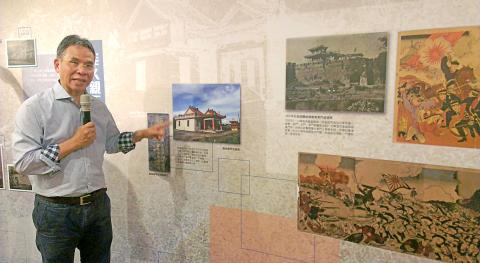An exhibition titled “Archival Exhibition on Inverting 1895: 120 Years After the War of Yi-We” (鉅變一八九五—乙未之役.一百二 十年檔案特展), which examines both resistance to and acceptance of Japanese colonial rule is currently being hosted by the Academia Sincia in Taipei.
The War of Yi-Wei (乙未之役), referring to the name of the year in the Chinese lunar calendar, is the Chinese term for the five-month war in 1895 between Empire of Japan and anti-Japanese insurgents who rose up after the Republic of Formosa declared independence in response to Japan’s annexation of the formerly insular Qing province.
Academia Sinica’s Institute of Taiwanese History director Hsieh Kuo-Hsing (謝國興), whose institute jointly organized the exhibition with the Academia Sinica’s Digital Center, said the exhibition is named “Inverting 1895” because it focuses on reversing nationalist historiography that focuses solely on resistance.

Photo: Tang Chia-ling, Taipei Times
The prevalent Han-Chinese nationalist perspective is simplistic and distorts historical fact, he said.
“In order to give full justice to history’s complexity, the interpretation of the past must proceed from the original documents and texts, instead of textbooks,” Hsieh said.
Most of the island’s inhabitants chose to accept Japanese rule in 1895 in order to survive, he said.
“There are multiple strategies to achieving survival, and welcoming Japanese rule was a viable alternative to resistance,” Hsieh said, adding that denouncing people for being “obsequious” to Japan or the Qing Dynasty is prejudicial and narrow-minded.
Hsieh said there are other narratives the exhibition aims to subvert. For example, he called the Republic of Formosa’s founding “a pretext” that has little to do with Taiwanese independence, but a “stratagem to thrust the Japanese annexation of Taiwan onto the international stage.”
Hsieh said the strategy backfired because no nation expressed interest in an intervention, and Formosa Republic officials, including its president Tang Ching-sung (唐景崧), fled.
“The only people who resisted Japan courageously were ordinary citizens. All of the officials had turned tails,” he said.
After the First Sino-Japanese War, Japan included in the Treaty of Shimonoseki articles that, in addition to annexing Taiwan, gave its inhabitants two years to decide whether to sell their property and leave or to remain in Taiwan under Japanese rule, Hsieh said. About 6,000 people emigrated, or only about one person in 1,000 in relation to the pre-war population, Hsieh said.
“Historians of Taiwan by consensus consider ‘Japanese rule’ (日治) to be better as a term of periodization because it reflects the epoch’s historical reality and is more neutral, while ‘Japanese occupation’ (日據) is far less supported by evidence, since Japanese rule was not based on a forceful military occupation,” Hsieh said.
After the end of the war, inhabitants of Taiwan received internal passports that identified them as “new subjects” (新臣民), while Japanese citizens were identified as “civilians” (平民), he said.

Taiwanese can file complaints with the Tourism Administration to report travel agencies if their activities caused termination of a person’s citizenship, Mainland Affairs Council Minister Chiu Chui-cheng (邱垂正) said yesterday, after a podcaster highlighted a case in which a person’s citizenship was canceled for receiving a single-use Chinese passport to enter Russia. The council is aware of incidents in which people who signed up through Chinese travel agencies for tours of Russia were told they could obtain Russian visas and fast-track border clearance, Chiu told reporters on the sidelines of an event in Taipei. However, the travel agencies actually applied

Japanese footwear brand Onitsuka Tiger today issued a public apology and said it has suspended an employee amid allegations that the staff member discriminated against a Vietnamese customer at its Taipei 101 store. Posting on the social media platform Threads yesterday, a user said that an employee at the store said that “those shoes are very expensive” when her friend, who is a migrant worker from Vietnam, asked for assistance. The employee then ignored her until she asked again, to which she replied: "We don't have a size 37." The post had amassed nearly 26,000 likes and 916 comments as of this

New measures aimed at making Taiwan more attractive to foreign professionals came into effect this month, the National Development Council said yesterday. Among the changes, international students at Taiwanese universities would be able to work in Taiwan without a work permit in the two years after they graduate, explainer materials provided by the council said. In addition, foreign nationals who graduated from one of the world’s top 200 universities within the past five years can also apply for a two-year open work permit. Previously, those graduates would have needed to apply for a work permit using point-based criteria or have a Taiwanese company

The Shilin District Prosecutors’ Office yesterday indicted two Taiwanese and issued a wanted notice for Pete Liu (劉作虎), founder of Shenzhen-based smartphone manufacturer OnePlus Technology Co (萬普拉斯科技), for allegedly contravening the Act Governing Relations Between the People of the Taiwan Area and the Mainland Area (臺灣地區與大陸地區人民關係條例) by poaching 70 engineers in Taiwan. Liu allegedly traveled to Taiwan at the end of 2014 and met with a Taiwanese man surnamed Lin (林) to discuss establishing a mobile software research and development (R&D) team in Taiwan, prosecutors said. Without approval from the government, Lin, following Liu’s instructions, recruited more than 70 software